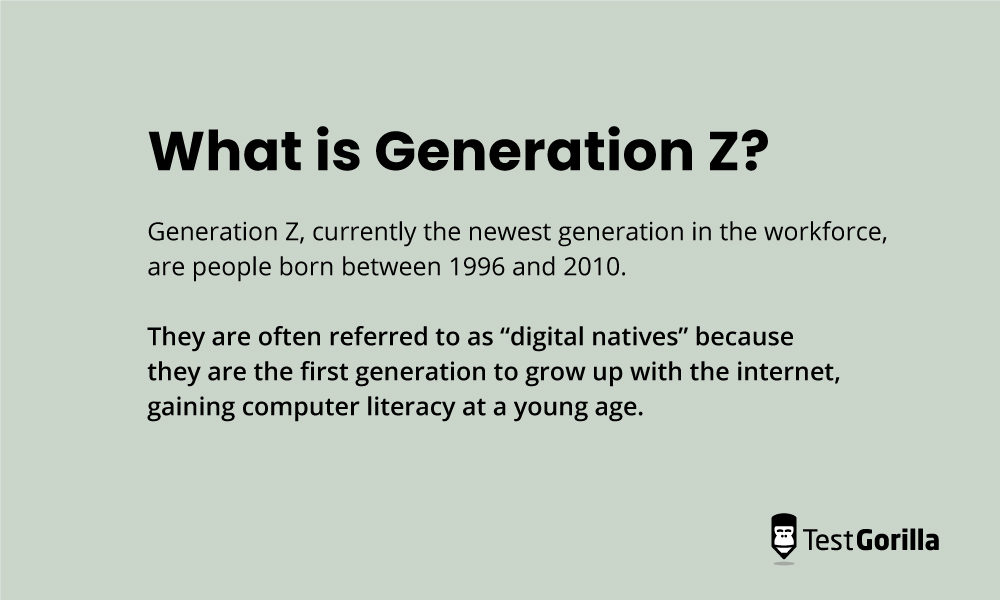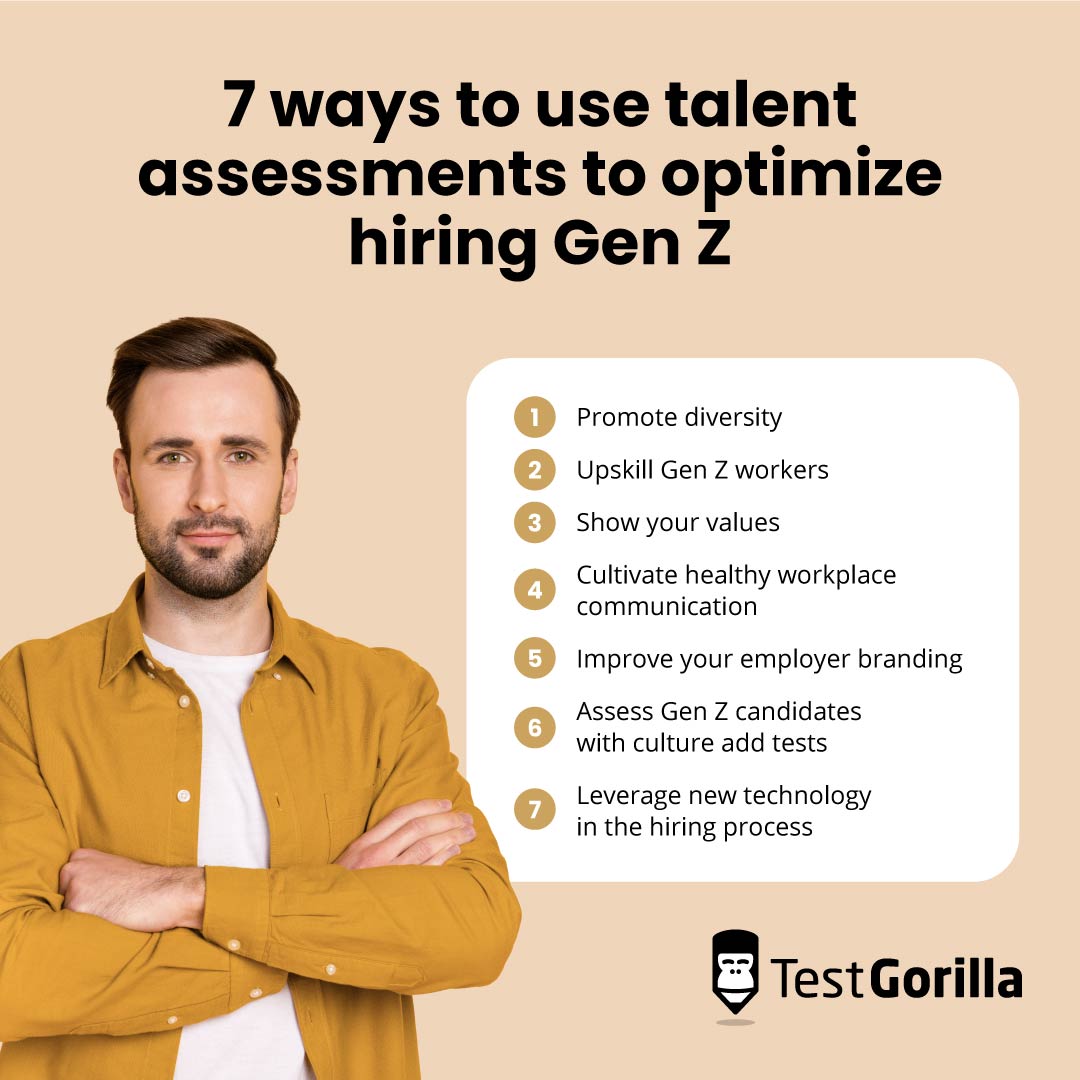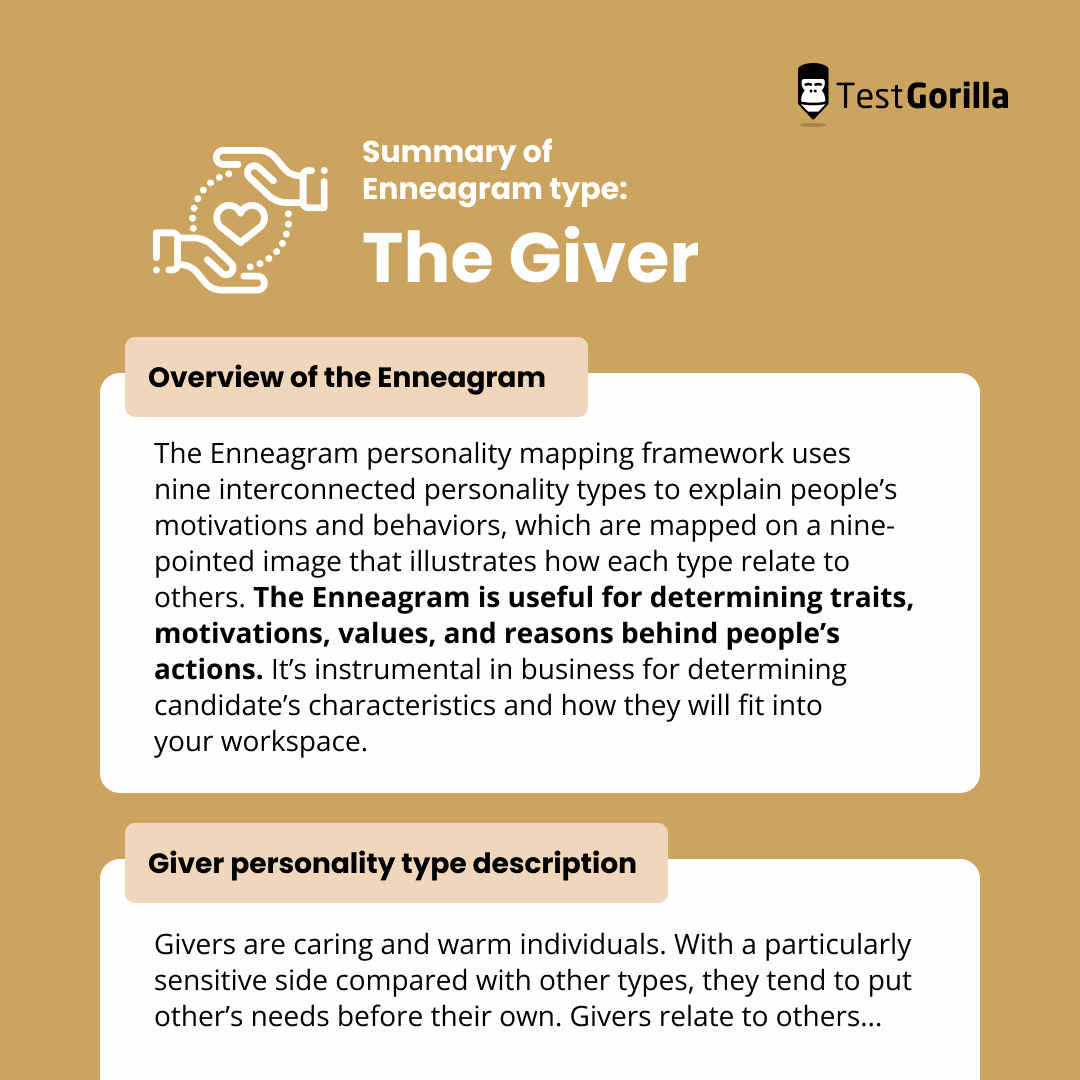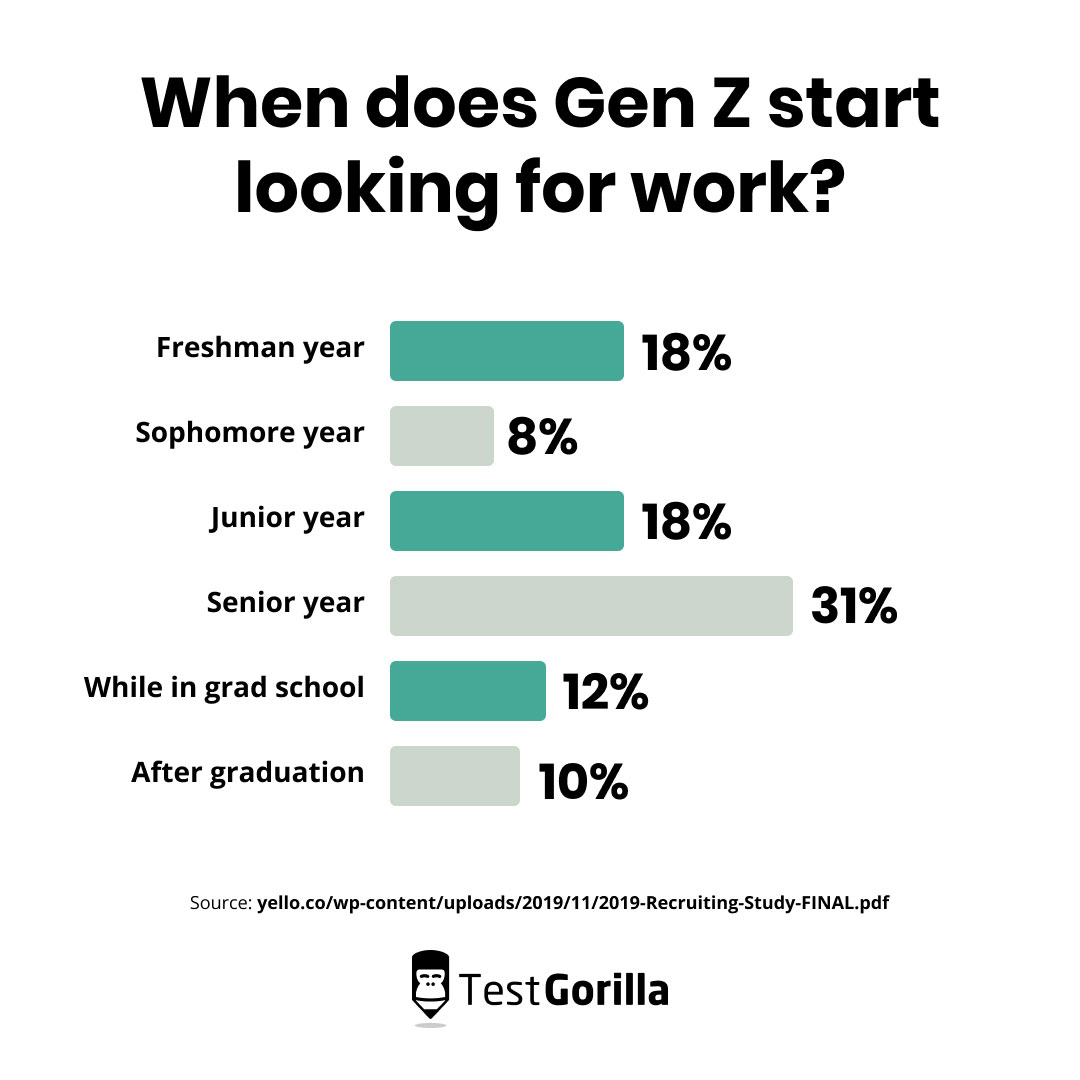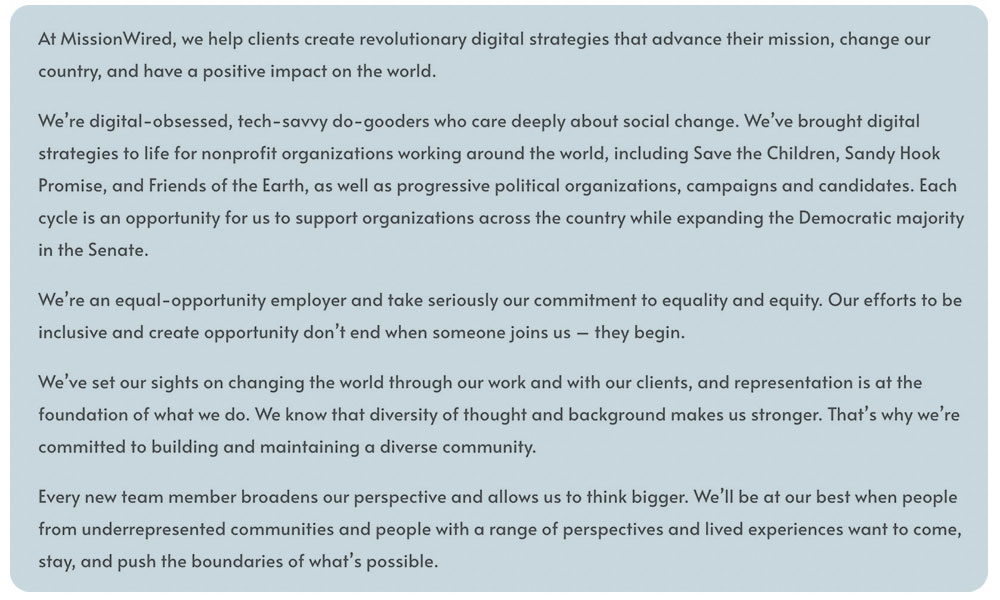Millions of job candidates are from Generation Z. In fact, Gen Z is on track to represent about 27% of the workforce by 2025.[1]
They are a distinct generational workforce with their own skills, preferences, and needs.
Former recruitment tactics that may have worked on baby boomers, Gen X, and even some millennials can’t be trusted for hiring Gen Z talent.
That’s why employers need to design new hiring processes and recruiting strategies that speak to Gen Z’s concerns about diversity, company culture, technology, and development opportunities.
Talent assessments are a fundamental part of that strategy.
In this article, we cover what Generation Z is, the difficulties with hiring them, the seven ways talent assessments overcome these challenges, and some additional trends you can use to optimize your Gen Z recruitment efforts.
Table of contents
- What is Generation Z?
- The difficulties with hiring Gen Z
- How talent assessments help with recruiting Gen Z
- 7 ways to use talent assessments to optimize hiring Gen Z
- Beyond talent assessments: 4 Gen Z hiring trends and how to leverage them as best practices
- Use talent assessments to attract, engage, and hire Gen Z talent
What is Generation Z?
Generation Z, currently the newest generation in the workforce, are people born between 1996 and 2010.
They are often referred to as “digital natives” because they are the first generation to grow up with the internet, gaining computer literacy at a young age.
To get a clearer picture of the age dynamics, some of the oldest Gen Zers have established careers and families of their own, while the youngest are in their preteen years.
What does Gen Z value?
No single generation is a monolith. But Gen Z, like the generational cohorts before and after them, have unique values and preferences.
For example, Gen Zers live large portions of their life online. They establish and nurture their relationships online and value speedy access to information via search engines, social media, and chat groups.
Whereas previous generations tended to discuss passions and interests in person, Gen Zers have the bulk of these discussions over the internet.
As the most racially and ethnically diverse generation, Gen Z strives for a diverse community.
The typical Gen Zer cares about others and is highly collaborative, seeking social interaction to maintain communication and relevance within different communities.
Amid these desires to connect, Gen Zers also value authenticity and tend to avoid hierarchical forms of leadership. They also value pragmatism and flexibility in their personal lives and in the workplace.
Remote work opportunities, flexible work policies, and self-care are all core professional Gen Z values.
Generation Z employees also value a healthy work-life balance.
A survey from 2022 found more than 25% of Gen Z employees were likely to quit within the next year.
The three main reasons driving these decisions were:
Unsatisfactory salary
Feeling burnout at work
Not doing work they are passionate about
Hiring Millennials vs. hiring Gen Z
Hiring millennials is similar to hiring Gen Z, but it’s not quite the same process.
Millennials, born between 1981 and 1996, are similar to Gen Zers but have some key differences related to:
Topic | Millennials | Gen Z |
Stability | Millennials value stability (34%) | Generation Z tends to look for their dream job (32%)[2] |
Cost of education | Millennials are less concerned about the cost of education (13%) | Generation Z are more concerned (21%) |
Parental influence | Millennials are less influenced by their parents (36%) | Generation Z is more influenced (42%) |
Entrepreneurship | Millennials tend to favor teamwork | Gen Zers tend to be more entrepreneurial than millennials, valuing independent thinking and creativity |
Types of feedback | Millennials prefer encouraging feedback | Generation Z prefers more straightforward feedback[3] |
Reasons for quitting a job | Millennials tend to leave their jobs because they feel burnt out | Gen Z cites this reason too but tends to leave jobs that feel unfulfilling |
The difficulties with hiring Gen Z
Gen Z is a unique generation that requires a unique talent acquisition strategy.
Traditional hiring strategies often miss the mark when it comes to meeting these candidates where they are.
Let’s explore the key challenges organizations face when recruiting Gen Z talent.
Adopting new technologies
Generation Z is drawn to organizations that use technology to provide a more meaningful, streamlined hiring process and work experience.
This is a challenge for many businesses because they need to purchase or develop technologies that cater the candidate and employee experience to several generations’ desires, including those of Gen Z.
Generation Z, in particular, demands businesses adopt cutting-edge tools that optimize the application process, and increase their autonomy and performance once hired.
Gen Z communication preferences
Although remote hiring processes have become the new norm, many businesses undervalue Generation Z’s preference for one-on-one, personalized communication during those processes.
Yes, that includes a surprising desire for face-to-face communication in addition to text and other digital communication – 39% of Gen Z have this preference.[4]
Organizations may also struggle to find the right balance between adequately describing the requirements and responsibilities of a role with Gen Z’s preference for immediacy, clarity, and expediency.
When, where, and how Gen Z search for jobs
Research shows a quarter of Gen Z students start their job search within their first two years of college.
A major challenge businesses face is developing talent pipelines for younger potential employees who have already begun forming opinions about competing organizations (and yours).
That said, businesses shouldn’t expect Gen Z to seek them out at career fairs or send torrents of resumes.
They should be proactive in offering Gen Zers opportunities to join their organizations by being more personal, social, and exciting, both in their brand representation and communication style.
Nearly 80% of Generation Z job seekers use job network sites to find employment.[5]
Although social media plays a comparatively small role, research from Handshake shows that increasing numbers of Gen Z graduates are looking for jobs via social media platforms.
Businesses need to increase and personalize their recruitment presence on these sites and platforms to attract Gen Zers.
Generation Z, similarly to previous generations, leverages personal and professional networks to get jobs, with college-educated Gen Zers also relying on formalized resources from colleges and universities.
Catering employee referral programs and career outreach to these areas is also important if organizations want to stay competitive in the Gen Z hiring market.
Outdated recruitment processes
Businesses that rely on traditional hiring practices like resume and degree requirements need to design a more effective recruitment process to attract Gen Z talent.
Traditional hiring practices overlook large swaths of Gen Z talent who have skipped college to perfect industry-specific skills through bootcamps, certificate programs, and self-teaching.
For example, STARs, or workers skilled through alternative routes, are skilled job candidates who can excel in many roles but are eliminated from role consideration because of their backgrounds.
In addition to ditching traditional practices, companies need to design better recruitment processes for Gen Z by:
Building strong referral networks
Offering flexible work opportunities
Displaying DEI credentials
Aligning company values with actions
Providing learning and development opportunities
Integrating these practices takes time and money, but it’s worth it in the long run.
How talent assessments help with recruiting Gen Z
Talent assessments are an effective tool to attract and hire talented Gen Z workers.
Multi-measure skills tests and personality assessments give employers a 360-degree view of candidates while giving Gen Z candidates a quick and objective way to show their skills.
Let’s take a closer look at how to hire Gen Z with talent assessments.
Increase diversity
According to our State of Skills-Based Hiring 2022 report, 91% of employers saw an increase in diversity when using skills-based hiring practices like talent assessments.
Multi-measure talent assessments boost diversity hiring by eliminating arbitrary requirements to evaluate candidates’ ability to actually do the job.
Talent assessments level the playing field because they encourage applicants from a range of backgrounds, experiences, or qualifications to participate in the hiring process.
Employers widen their talent pool with skilled, innovative talent while proving to Generation Z that they are committed to diversity at every stage of the employee life cycle.
Improve company culture
Generation Z craves a positive workplace culture, and they’re not afraid to reject a job offer if they spot red flags.
They want to be treated like human beings, not statistics or cogs in the hiring machine.
Multi-measure talent assessments help improve your company culture because they go beyond evaluating candidates’ technical skills or culture fit.
They also measure:
Personality type: How a candidate’s behavioral attributes mesh with your existing employees
Motivation: What type of role and responsibilities engage and motivate your employee
Situational judgment: How a candidate responds to a certain situation
Culture add: How a candidate’s unique background can expand your existing culture
Talent assessments are part of a holistic hiring process that considers the entire candidate to create a productive and respectful culture.
Shorten time-to-hire
Gen Z job seekers want hiring efficiency.
Shortening the hiring process with talent assessments is a great way to save candidates’ and employers’ time during the recruitment phase.
In fact, the State of Skills-Based Hiring 2022 report also found that 91.4% of organizations reduced their total time-to-hire when using skills-based hiring tools.
Skills tests have a positive impact on hiring speed by:
Making more accurate hires
Identifying top talent faster
Reducing the likelihood of having to hire replacements
Minimizing candidate ghosting
Promote innovative hiring
Although skills-based hiring is on the rise, multi-measure talent assessments remain an innovative tool to attract and secure quality candidates.
From a Gen Z candidate’s perspective, their skills and abilities are all that should matter to an employer.
Talent assessments meet this demand with cutting-edge, easy-to-use technology that streamlines the hiring process.
They turn the traditional hiring model on its head by shortening the process for everyone involved, improving the candidate experience, and boosting predictive validity.
In fact, research shows skills tests are five times more predictive of job performance than hiring for education.[6]
Support learning and development
Gen Z workers don’t want to settle for jobs that pay fairly but don’t nurture their development.
They want learning and development opportunities to expand their skills and grow their careers.
Talent assessments support Gen Z learning and development by:
Identifying existing skills and areas for improvement
Evaluating personality and behavior to find the right roles
Tracking upskilling and reskilling progress with role-specific skills tests
7 ways to use talent assessments to optimize hiring Gen Z
Evaluating Gen Z skills and personality types is a crucial step to securing the right talent.
But what are some tangible ways to use talent assessments to optimize Gen Z hiring?
Here are seven ideas to get you started:
Ways to use talent assessments | How it works |
Promote diversity | Use objective, multi-measure talent assessments to eliminate bias and track diversity goals |
Use skills tests to upskill Gen Z talent | Develop employees’ skills and work experience with role-specific skills tests |
Show your values | Provide an unbiased, streamlined hiring process with an accurate depiction of the role |
Cultivate healthy workplace communication | Share results of skills assessments to keep candidates, employees, and employers on the same page about development |
Improve your employer branding | Write great job descriptions to refocus your brand on innovation, creativity, and efficiency |
Assess candidates with culture add tests | Use culture add tests to understand the unique value a candidate brings to the table |
Leverage new technology | Implement skills-based, remote talent assessment platforms to optimize the hiring process and appeal to Gen Z talent |
1. Promote diversity with talent assessments
Gen Z job seekers prioritize workplace diversity, but they are also one of the most ethnically diverse generations to date.
As a skills-based organization, use talent assessments to promote diversity recruiting by:
Encouraging diverse talent to take your assessments
Emphasizing your assessments’ objectivity
Using your talent assessment to measure current diversity and set goals
Centering talent assessments in your recruitment process (not education or experience)
Using screening tests to eliminate unconscious bias
Let’s say you’re hiring a business manager, for example.
TestGorilla’s Business Operations Management test evaluates candidates’ ability to plan, organize, and control operations.
At no point during this skills test do factors like age, race, ethnicity, or gender come into play.
Similarly, education and prior work experience are irrelevant to the test’s aim: Identify the best performer for the role.
Why?
Because great management assessment tests measure vital management skills like communication, business judgment, culture add, cognitive skills, and problem-solving – not a person’s education or background.
2. Upskill Gen Z workers with skills tests
Gen Z prefers learning hands-on instead of listening or reading.
Incorporate skills tests into your employee learning and development strategy to give Gen Z talent the opportunity to complete role-specific tasks and gain meaningful work experience in a particular field.
Apple, for example, has two professional training courses that use skills tests to strengthen the skills of potential employees in its talent pipeline. In other words, these tests are a key part of its talent pool management.[7]
The Apple Device Support course develops and evaluates candidates’ skills for roles like help desk professionals, technical coordinators, and service providers.
The majority of current Apple employees are on the older side of Gen Z and the younger side of millennials (20-30 years old), which shows how an effective talent assessment program is a great way to secure high-performing Gen Z talent.[8]
3. Show your values
When considering how to attract Gen Z employees, it’s important to show them your values.
Talent assessments help organizations show their values by:
Providing an unbiased, streamlined hiring process
Digitizing the candidate experience
Providing an accurate depiction of what the role entails
Respecting candidates’ time and effort
They are also a powerful way to show your values because they do more than pay lip service to vague diversity goals, virtue signaling, and social responsibility promises.
They challenge Gen Z candidates to bring their best to the recruitment process to prove they have the skills and attitude to succeed individually and as a part of your organization.
According to Nabila Salem, president of the cloud talent creation company Revolent, companies with values and ethics that exist purely to align with Gen Zers might be missing the whole point of having ethics and values.[9]
Instead, Revolent created initiatives to make the sector it operates in a fairer place for all, not to simply bait Gen Z into filling vacancies.
4. Cultivate healthy workplace communication
Creating a diverse and inclusive workplace culture is crucial for your employees’ mental health, but it’s not the only step an organization should take to attract Gen Z talent.
Talent assessments also motivate Gen Z to:
Build their technical skills
Improve their soft skills
Create meaningful work
When sharing the results of your skills tests with Gen Z candidates or employees, offer constructive feedback and show appreciation and recognition for great performance.
This also shows your Gen Z candidates that your organization’s culture is founded on healthy workplace communication, a key value of Generation Z.
For example, when candidates complete TestGorilla’s Enneagram Personality test, employers receive an in-depth report with details about the candidates’ strengths and weaknesses, areas for improvement, and coachable tips to help their professional development:
Employers can use this data to develop their employees, but it also shows candidates their workplace communication isn’t strictly hierarchical or fixated on the bottom line – it’s about empowerment and progress.
5. Improve your employer branding
It’s likely that Gen Z has Googled your company to find out if you're a good place to work.
Give your organization a competitive edge by emphasizing talent assessments in your employer branding.
Job descriptions are often the first place that Gen Z talent become familiar with brands.
Great job descriptions for Generation Z talent:
Document the responsibilities of the role
Explain the duties expected of the employee
Specify the skills required to efficiently perform the role
Emphasizing talent assessments in your job descriptions refocuses your employer brand on innovation, creativity, hard data, and skills development.
6. Assess Gen Z candidates with culture add tests
Gen Z aren’t fans of the traditional culture fit approach, which boils down to whether or not a hiring manager likes a candidate’s personality.
Nick Diaz, a Gen Z professional, noted in Forbes that he paid close attention to the types of questions interviewers asked him.[10]
He was looking for questions that showed an organization was interested in what he had to bring to the table, not just how well he slotted into the existing culture.
In addition to interviews, your talent assessments should thread the same needle: Show off your existing culture’s strengths while identifying areas for career growth that the right employee can take advantage of.
TestGorilla’s Culture Add test, for example, objectively assesses how a candidate’s values and behaviors align with your organization’s.
Instead of identifying candidates that maintain the status quo, culture add tests overcome a candidate’s desire to please because they can’t give you “ideal” answers based on how you respond to them in a conversation, for example.
Candidates receive a list of relevant words in different values and behavior categories that they have to rate based on level of importance.
There are no right or wrong answers – only measurable data about a candidate’s values and potential to positively impact your organizational culture.
7. Leverage new technology in the hiring process
Gen Z is the most technologically advanced generation currently. As tech-savvy digital natives, different forms of technology are seamlessly integrated into every aspect of their lives, like relationships, education, shopping, and finding a job.
Multi-measure, remote talent assessments are a new way to recruit as part of an efficient, objective, and affordable hiring process for candidates and employers alike.
Employers who use TestGorilla for their hiring needs offer candidates assessments from our extensive library of 300+ tests, all developed and tested by subject matter experts.
Candidates take tests remotely and can complete them in less than 10 minutes.
Gen Z candidates no longer have to go through the arduous and often meaningless process of typing out resumes and cover letters or answering vague questions via in-person interviews.
With talent assessments, candidates can quickly navigate intuitive platforms and answer intriguing, work-related questions that reflect what the role entails while giving employers valuable candidate data.
Employers can also customize their own tests with role-specific, behavioral, or situational questions to gain valuable data that predicts candidate performance.
Beyond talent assessments: 4 Gen Z hiring trends and how to leverage them as best practices
Talent assessments are an ideal fit with Gen Z candidates because they challenge, engage, and respect Gen Z’s unique skills and abilities.
Let’s explore some additional Gen Z recruiting trends that boost talent acquisition.
1. Campus recruitment
Campus recruitment is the process of seeking out and hiring recent grads and students nearing the completion of their studies.
It usually involves partnering with educational institutions to set up job fairs on campus to hire directly from colleges and universities.
Universities are an excellent place to find Gen Z talent because even the oldest of this generation are only in their mid-20s.
One study shows just how early Gen Z starts looking for jobs:
Campus recruitment is a cost-effective way to boost high-volume hiring for Gen Z candidates because it gives your hiring team access to a large pool of young high potentials (HiPos).
Businesses should be ready to implement campus recruitment, and many already are. One study showed that 62% of organizations plan to engage in college-specific hiring events.[11]
Campus recruitment lets you connect with candidates face to face and display your company’s values and ethics – two significant factors for Gen Zers considering a job.
2. Build a strong employee influencer network
An employee influencer program is a marketing and PR initiative to turn workers into social media influencers to bring awareness to your brand and business.
Your existing employees are a valuable resource when hiring and managing Gen Z.
Since 60% of Gen Zers prefer referrals, it’s a good idea to rely on real people and testimonials to help attract new talent.[12]
Many companies create their own hashtags to help draw attention to their programs, such as #LifeAtGartner, #LifeAtVisa, or #LifeAtDell.
When employees use these hashtags on their personal social media accounts or repost content from their employer, they become employee influencers.
This is especially helpful when looking for job applicants: LinkedIn found employee-shared jobs had 30% more applications.[13]
3. Display your diversity, equity, and inclusion initiatives
When developing strategies for how to attract and how to retain Gen Z employees, focus on your job descriptions. They’re a great place to advertise your talent assessments.
But you should also use them to display your DEI initiatives. Before diving into the skills and responsibilities sections of your job descriptions, take a moment to articulate your commitment to diversity, equity, and inclusion.
This job posting at MissionWired is a thoughtful and respectful example of how to communicate that message:
4. Flexible working arrangements
Gen Zers prefer hybrid working environments because most want the option of remote work, however, 75% want in-person feedback, and 39% want to communicate with their team in person.[14]
The American transport service Lyft announced in March 2022 that it was switching to a fully hybrid work environment.[15]
Hybrid work at Lyft means that employees can work in the office, at home, or a combination of the two.
Lyft chose this model to not only comply with a growing want and need for remote work but also to retain a strong in-person office-life culture.
Lauren Smith, the vice president of talent acquisition research at Gartner Inc., says Gen Z expects a job to offer the perk of flexible work options so they can work from whatever place fits their lifestyle.[16]
If you want to attract Gen Z employees, you need to offer them this work flexibility, whether that’s with location, hours, or both.
Use talent assessments to attract, engage, and hire Gen Z talent
Traditional hiring practices simply don’t cut it when it comes to recruiting talented Gen Z candidates.
As the most diverse and digitally literate generation, Gen Z demands inclusive, equitable, and innovative hiring processes. Organizations need to take advantage of every tool available to bridge the gap.
Talent assessments are an integral part of this talent acquisition strategy because they overcome unconscious bias in hiring by implementing objective, data-backed skills tests.
They’re also convenient, remote-accessible platforms for Gen Z candidates to show off their skills quickly and efficiently.
Explore TestGorilla’s extensive test library to attract Gen Z candidates, hire interns, and develop your existing talent.
Sources
“Chart: How Gen Z employment levels compare in OECD countries”. (March 26, 2021). World Economic Forum. Retrieved August 21, 2023. https://www.weforum.org/agenda/2021/03/gen-z-unemployment-chart-global-comparisons/
Segreto, Paul. (September 21, 2022). “The Future of Entrepreneurship: Millennials & Gen Z Will Lead the Way!”. LinkedIn. Retrieved August 21, 2023. https://www.linkedin.com/pulse/future-entrepreneurship-millennials-gen-z-lead-way-paul-segreto/
Stannett, Duncan. (September 23, 2022). “What do Gen Z and millennials expect in the workplace?”. IR Global. Retrieved August 21, 2023. https://irglobal.com/article/what-do-gen-z-and-millennials-expect-in-the-workplace/
Roy, Shibani. (December 27, 2022). “Top 10 Ways to Effectively Communicate with Generation Z”. LeadSquared. Retrieved August 25, 2023. https://www.leadsquared.com/industries/education/how-higher-education-communicates-with-gen-z
“Trends in resources Gen Z uses for job hunting”. (January 23, 2023). Handshake. Retrieved August 21, 2023. https://joinhandshake.com/blog/network-trends/trends-in-resources-gen-z-uses-for-job-hunting/
“Taking a skills-based approach to building the future workforce”. (November 15, 2022). McKinsey & Company. Retrieved August 21, 2023. https://www.mckinsey.com/capabilities/people-and-organizational-performance/our-insights/taking-a-skills-based-approach-to-building-the-future-workforce
“Apple introduces new professional training to support growing IT workforce”. (May 18, 2022). Apple. Retrieved August 21, 2023. https://www.apple.com/newsroom/2022/05/apple-introduces-new-professional-training-to-support-growing-it-workforce/
“Apple Demographics and Statistics”. Zippia. Retrieved August 21, 2023. https://www.zippia.com/apple-careers-825/demographics/
Clark, Scott. (August 1, 2022). “Gen Z is a digitally-savvy generation unlike any other. What does this generation truly care about, and how can you align with their values in a genuine way?”. CMS Wire. Retrieved August 21, 2023. https://www.cmswire.com/customer-experience/do-your-brands-values-align-with-those-of-gen-z/
Diaz, Nick. (September 5, 2022). “The Z Factor: What Companies Need To Know About Hiring Gen Z”. Forbes. Retrieved August 21, 2023.
Related posts
Hire the best candidates with TestGorilla
Create pre-employment assessments in minutes to screen candidates, save time, and hire the best talent.
Latest posts
The best advice in pre-employment testing, in your inbox.
No spam. Unsubscribe at any time.

Hire the best. No bias. No stress.
Our screening tests identify the best candidates and make your hiring decisions faster, easier, and bias-free.
Free resources
This checklist covers key features you should look for when choosing a skills testing platform
This resource will help you develop an onboarding checklist for new hires.
How to assess your candidates' attention to detail.
Learn how to get human resources certified through HRCI or SHRM.
Learn how you can improve the level of talent at your company.
Learn how CapitalT reduced hiring bias with online skills assessments.
Learn how to make the resume process more efficient and more effective.
Improve your hiring strategy with these 7 critical recruitment metrics.
Learn how Sukhi decreased time spent reviewing resumes by 83%!
Hire more efficiently with these hacks that 99% of recruiters aren't using.
Make a business case for diversity and inclusion initiatives with this data.

